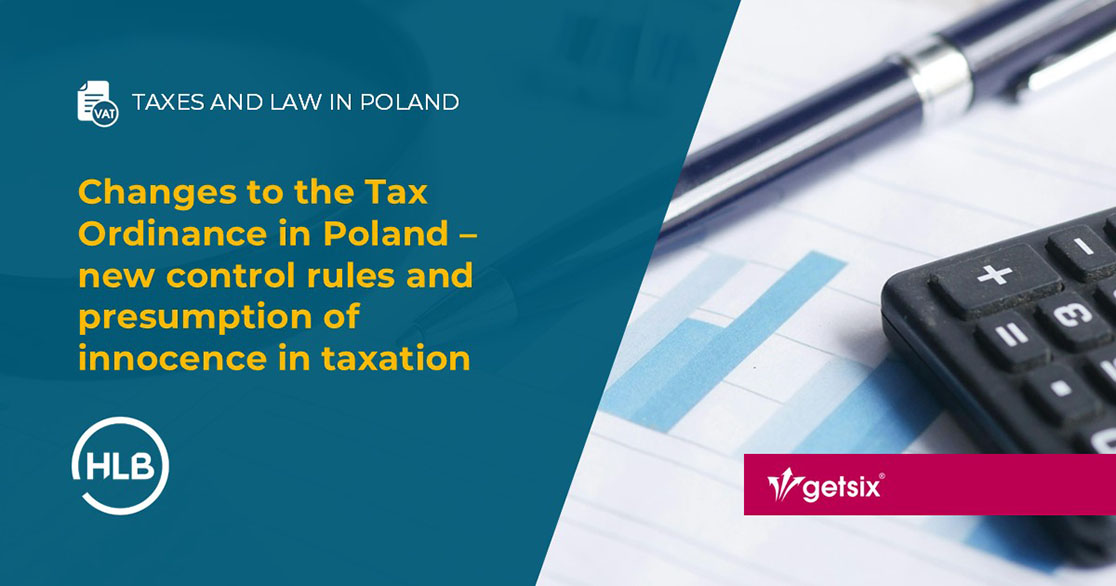Changes to the Tax Ordinance in Poland – new control rules and presumption of innocence in taxation
27 November 2025
27 November 2025

The changes to the Tax Ordinance, which came into force on 4 November 2025, significantly modify the relationship between taxpayers and tax inspection authorities. For the first time in years, the legislator has introduced regulations strengthening the position of entrepreneurs: both by limiting the length of audits and by introducing the principle of resolving doubts in favour of the taxpayer into the tax procedure. The changes result from two amending acts signed by the President of the Republic of Poland in October, published in the Journal of Laws under items 1414 and 1417, prepared as part of a deregulation package coordinated by a team led by Rafał Brzoska.
The new regulations are fundamental in nature and have a real impact on the tax authorities’ control practices, the development of entrepreneurs’ tax strategies and tax risk management. Below we present a full, in-depth discussion of both acts.
The first amendment – the Act of 12 September 2025 amending the Tax Ordinance Act (Sejm print no. 1439) – introduces a completely new case in which the taxpayer will not be obliged to pay interest for late payment in the event of a tax arrears finding.
If a tax or customs audit is not completed within 6 months of its commencement, the authority may not charge interest for late payment for the period:
from the day following the expiry of 6 months to the date of actual completion of the audit.
This is a seemingly simple regulation, but one that is of groundbreaking significance: the tax authorities will no longer derive financial benefits from the protracted nature of their own actions. Until now, the longer the audit lasted, the higher the interest for the state budget — which meant that entrepreneurs risked serious burdens in situations over which they had no control.
The 6-month limit does not include:
In practice, this means that the taxpayer:
This is particularly beneficial — the Act applies retroactively to audits initiated within 6 months prior to the date of entry into force, if they have not been completed before 4 November 2025. This solution, i.e. the application of provisions favourable to the taxpayer also to ongoing proceedings, is rare in tax law and confirms the pro-market nature of this amendment.
In practice, many entrepreneurs use tax advisory services in such situations. getsix® helps companies on a daily basis to prepare for audits, analyse documents and provide ongoing tax services, which facilitates their operation in a changing legal environment.
The second act – the Act of 12 September 2025 amending the Tax Ordinance Act (Sejm print no. 1265) – is of a much more fundamental nature. It introduces a new §2 to Article 122 of the Tax Ordinance Act, which reads as follows:
‘In tax proceedings initiated ex officio, doubts as to the facts that cannot be removed shall be resolved in favour of the party (…).’
This is an implementation of the principle known from the constitutional presumption of innocence, which has been applied for years in administrative proceedings (KPA), but has so far been absent from tax proceedings.
This refers exclusively to factual situations, e.g.:
However, this does not apply to interpretative doubts, i.e. disputes about the content of a provision. These are still not automatically resolved in favour of the taxpayer.
The rule of favourable resolution of doubts does not apply when:
Example: transactions between related companies, determination of market value, transfer pricing.
Example: proving the actual performance of a transaction when deducting VAT (the burden of proof does not disappear).
Example: tax fraud schemes, activities threatening the stability of the system. This exception, although it sounds broad, is to be applied only in special situations. It cannot be treated as an excuse for not applying this principle.
Like the first amendment, this one also applies to proceedings initiated before its entry into force, if they have not been completed by 4 November 2025.
Entrepreneurs gain:
No interest after 6 months means:
Tax authorities:
The changes to the Tax Ordinance are in line with:
Importantly, the implementation of the principle of resolving doubts in favour of the taxpayer comes eight years after its introduction into the Code of Administrative Procedure, which highlights how long it took to regulate this mechanism in the field of taxation.
New changes to the Tax Ordinance:
These are some of the most important pro-taxpayer changes in recent years. It is worthwhile for entrepreneurs and accounting departments to familiarise themselves with them in detail and implement appropriate compliance, control monitoring and tax risk management procedures.
If your company needs support in complying with the new tax regulations or in preparing for audits and conducting cases before tax authorities, please contact the getsix® team. We offer tax advice, assistance in interpreting regulations and ongoing support in relations with the tax administration.
Legal basis:
If you have any further questions or require additional information, please contact your business relationship person or use the enquiry form on the HLB Poland website.
***
Download the brochures providing general information and outlining the services that are offered by HLB member firms.
Learn moreClick below for more detailed information regarding population, major towns and cities, language, religion and holidays in Poland.
Learn more